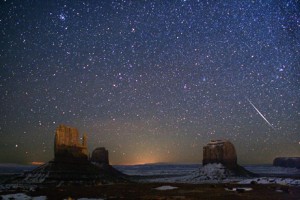 The Geminids are a meteor shower caused by the object 3200 Phaethon, which is thought to be a Palladian asteroid. This would make the Geminids the only meteor shower not originating from a passing comet.
The Geminids are a meteor shower caused by the object 3200 Phaethon, which is thought to be a Palladian asteroid. This would make the Geminids the only meteor shower not originating from a passing comet.
If you would like to see them, well tonight is the night … they have been building up to their peak …
For folks in the UK, your best chance is to get up at about 2am (once the moon has set), get away from street lights, wrap up warm, let your eyes accommodate to the darkness, then look up … hopefully to no clouds …
The shower is thought to be intensifying every year and recent showers have seen 120–160 meteors per hour under optimal conditions, generally around 2am to 3am GMT. The meteors in this shower appear to come from a radiant in the constellation Gemini (hence the shower’s name). However, they can appear almost anywhere in the night sky, and often appear yellowish in hue. The meteors travel at medium speed in relation to other showers, at about 22 miles per second, making them fairly easy to spot. The Geminids are now considered by many to be the most consistent and active annual shower.
The Article in the Guardian today reports …
With cloudless skies possible in many parts of Britain, this year’s shooting stars could be particularly memorable
Then goes on to advise …
Lovers of the night sky could be in for a treat ….. as clear conditions are predicted for one of the best astronomical shows of the year.
Some experts believe the annual Geminid meteor shower is becoming more spectacular – though if it is, nobody is sure why – and with cloudless skies possible in many parts of the country, this year’s event could be a particularly memorable one.
At its peak and in a clear, dark sky, up to 100 meteors – or shooting stars – may be seen every hour. The best time to see it is expected to be late on Monday night and in the early hours of Tuesday after the moon has set.
For more details, you can read the full article by clicking here …